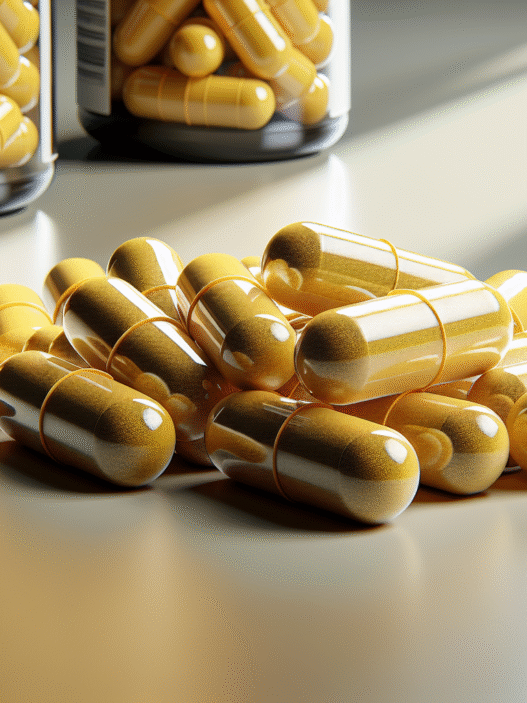Benefits of Berberine
Berberine has garnered attention in the world of functional medicine for its numerous health benefits. This compound, derived from several plants, has been researched for its impact on blood sugar regulation, weight loss support, and cholesterol management.
Blood Sugar Regulation
One of the most significant advantages of berberine is its ability to regulate blood sugar levels. Research indicates that taking 1 gram of berberine daily can lead to a substantial reduction in fasting blood sugar levels. A 2008 study involving 116 individuals with type 2 diabetes found that berberine usage lowered fasting blood sugar levels by approximately 20% (Healthline).
In a three-month trial with newly diagnosed type 2 diabetic patients, berberine resulted in notable decreases in key blood sugar measures:
| Measurement Type | Before Treatment | After Treatment |
|---|---|---|
| Hemoglobin A1c | 9.5% ± 0.5% | 7.5% ± 0.4% |
| Fasting Blood Glucose | 10.6 ± 0.9 mmol/L | 6.9 ± 0.5 mmol/L |
| Postprandial Blood Glucose | 19.8 ± 1.7 mmol/L | 11.1 ± 0.9 mmol/L |
| Plasma Triglycerides | 1.13 ± 0.13 mmol/L | 0.89 ± 0.03 mmol/L |
The data highlights berberine’s effectiveness in managing blood sugar levels and indicates its potential as a therapeutic option for those with diabetes.
Weight Loss Support
Berberine also appears to have a positive impact on weight management. Evidence suggests that individuals with obesity can lose approximately 5 pounds on average after taking 500 milligrams of berberine three times daily for 12 weeks. Participants in these studies also experienced a reduction of about 3.6% in body fat.
Additionally, berberine may help individuals with metabolic-related conditions—such as type II diabetes, polycystic ovary syndrome (PCOS), cardiovascular disease (CVD), and non-alcoholic fatty liver disease (NAFLD)—induce weight loss, as measured through various metrics such as BMI and waist circumference. However, studies in healthy participants have shown mixed results regarding its weight-loss efficacy (Examine).
Cholesterol Management
Berberine is also beneficial for heart health due to its cholesterol-lowering properties. A review of 16 studies indicated that this compound can effectively reduce levels of cholesterol and triglycerides while increasing HDL (good) cholesterol. Importantly, berberine has also been shown to lower apolipoprotein B levels, which is a significant marker for heart disease risk, by 13-15%.
These three areas—blood sugar regulation, weight loss support, and cholesterol management—highlight the multifaceted benefits of berberine. For those interested in exploring the capabilities of this compound, understanding how soon before eating should you take berberine may enhance its effectiveness in these health domains.
Additional Health Benefits
Berberine is not only valued for its role in managing blood sugar and weight but also offers several additional health benefits. This section explores its antioxidant and anti-inflammatory properties, which contribute to overall health and wellness.
Antioxidant Properties
Berberine is known for its antioxidant effects, helping to combat oxidative stress in the body. Antioxidants are essential for neutralizing free radicals, which can cause cellular damage and contribute to aging and chronic diseases. By reducing oxidative stress, berberine may help protect against conditions such as cancer and heart failure.
| Benefit | Description |
|---|---|
| Neutralizes Free Radicals | Helps protect cells from damage caused by oxidative stress |
| Reduces Risk of Chronic Diseases | May lower the likelihood of developing conditions linked to aging and inflammation |
Research indicates that incorporating berberine into a daily routine may enhance the body’s resilience against these chronic health issues.
Anti-inflammatory Effects
In addition to its antioxidant properties, berberine also exhibits anti-inflammatory effects. Chronic inflammation is associated with a range of health conditions, including heart disease, diabetes, and autoimmune disorders. By modulating the inflammatory response, berberine can play a role in supporting overall health and promoting longevity (Healthline).
| Benefit | Description |
|---|---|
| Reduces Inflammation | May lower levels of inflammation markers in the body |
| Supports Heart Health | Helps improve cardiovascular health by reducing inflammatory responses |
Berberine’s ability to address both oxidative stress and inflammation makes it a valuable addition to a holistic wellness approach. For more insights on the interactions between berberine and other health factors, consider reading about potential side effects or its effect on gut bacteria.
Both of these properties underscore berberine’s significance in functional medicine and holistic health approaches. By incorporating this powerful compound, individuals may find further benefits beyond its primary uses.
Berberine Dosage Recommendations
Understanding the appropriate dosage and timing for berberine can enhance its effectiveness, especially for followers of functional medicine and holistic wellness.
Standard Dosage
The common dosage recommendation for berberine is typically between 900 mg and 2,000 mg per day. This dosage should be divided into three to four doses taken throughout the day. A widely accepted standard is 500 mg three times a day, totaling 1,500 mg per day, with each dose taken half an hour before meals.
| Dosage | Frequency | Total Daily Amount |
|---|---|---|
| 500 mg | 3 times/day | 1,500 mg |
| 900-2,000 mg | 3-4 times/day | 900 – 2,000 mg |
Factors such as age, health status, and existing medical conditions can influence the appropriate dosage, so it is advisable to consult with a healthcare provider regarding personal needs.
Timing for Optimal Intake
Taking berberine at specific times can optimize its benefits. To maximize its effects on blood sugar levels and lipid management, it is recommended to take berberine half an hour before meals. This timing allows the supplement to work synergistically with the body’s natural processes associated with eating (Examine). It can also be beneficial to incorporate berberine into a daily routine by attaching it to morning and nighttime regimens to maintain consistency.
By adhering to these dosage and timing recommendations, individuals can potentially enhance the health benefits of berberine while minimizing the risk of side effects. For those interested in learning more about side effects, including digestive issues, refer to our article on is there a downside to taking berberine?.
Potential Side Effects
Understanding the potential side effects of berberine is important for those considering its use as a supplement. While it offers numerous health benefits, awareness of adverse reactions can help in making informed decisions.
Digestive Side Effects
One of the most common concerns associated with berberine supplementation is its potential impact on digestive health. When taken, especially in doses over 300 mg per day, berberine has been reported to cause several gastrointestinal side effects, which may include:
| Side Effect | Description |
|---|---|
| Diarrhea | Frequent loose or watery stools may occur in some individuals. |
| Constipation | Some users may experience difficulty in passing stools. |
| Flatulence | Increased gas can lead to discomfort and bloating. |
| Stomach Pain | General abdominal discomfort may arise. |
Due to its low bioavailability, berberine’s absorption varies, which can exacerbate these side effects in certain individuals (Examine). Anyone experiencing significant discomfort should consult a healthcare provider.
Interactions with Medications
Berberine’s effect on drug metabolism is another area of concern. It has the potential to inhibit several enzymes that are critical for the metabolism of certain medications. This could lead to increased effects or side effects of those medications. Particularly noteworthy is its interaction with:
| Medication | Interaction Effect |
|---|---|
| Cyclosporine | Berberine may slow the breakdown of cyclosporine, increasing its effects and associated side effects (WebMD). |
| Blood Sugar Medications | Due to berberine’s ability to lower blood sugar, there is a risk of hypoglycemia, especially when taken alongside diabetes medications. |
Individuals taking medications should consult healthcare professionals before starting berberine to avoid potential adverse interactions. For more information on the potential downsides, visit our article on is there a downside to taking berberine?.
Long-Term Effects of Berberine
The long-term use of berberine has become an important topic among those interested in its health benefits. Understanding the varied effects over different timeframes can help individuals optimize their health journey.
Initial Benefits
Initial improvements from berberine typically start to appear within the first few weeks of use. Users often notice changes in blood sugar levels and weight management. For example, those monitoring their blood glucose might see early outcomes that include better fasting insulin levels and lower postprandial blood sugar levels. Research indicates that some diabetic patients experienced notable decreases in fasting blood glucose levels from 9.6 ± 2.7 mmol/L to 7.8 ± 1.8 mmol/L within just a week of starting treatment.
Medium-Term Health Enhancements
The medium-term effects of berberine become evident typically around one to three months into the regimen. During this period, the benefits can become more pronounced. For instance, users may experience significant improvements in glycemic control and lipid profiles. Clinical studies show that continued use can result in reductions in HbA1c levels from an average of 8.1% to 7.3% in diabetic patients, demonstrating enhanced metabolic function. Another benefit observed is a marked decrease in fasting insulin and triglyceride levels, reinforcing the positive impact of sustained berberine intake.
| Timeframe | Expected Benefits |
|---|---|
| Initial (Weeks 1-4) | Blood sugar stabilization, early weight loss |
| Medium-Term (1-3 Months) | Improved HbA1c levels, better lipid profiles, enhanced insulin sensitivity |
Sustained Benefits
After three months of continuous use, the sustained benefits of berberine are more notable. These include long-lasting improvements in metabolic health and body composition. Users often find that their health gains are maintained, especially when berberine is paired with a balanced diet and regular physical activity. The integration of berberine into a comprehensive health strategy helps promote sustained effects, including long-term reductions in cholesterol levels and maintained weight loss.
Long-term users report consistent stabilization of blood sugar levels and other key health metrics, confirming berberine’s role in a preventive health regimen. Observations from clinical data suggest that sustained use can lead to optimum enhancements in overall health parameters over the long haul.
Combining berberine with lifestyle modifications optimizes the potential benefits while ensuring a holistic approach to health improvement. As individuals consider their choices, the right timing and dosage play crucial roles. For further queries about berberine, including advantages and drawbacks, check out our article on is there a downside to taking berberine?.
Berberine and Specific Health Conditions
Impact on Diabetes
Berberine has gained attention for its potential benefits in managing diabetes, particularly type 2 diabetes. Studies indicate that berberine can significantly lower blood sugar levels. For instance, a study published in 2008 demonstrated that taking 1 gram of berberine per day resulted in a 20% decrease in fasting blood sugar among 116 participants diagnosed with diabetes.
In addition, berberine has shown substantial effects on various diabetes-related markers. In a three-month trial involving newly diagnosed type 2 diabetic patients, researchers reported significant decreases in hemoglobin A1c, fasting blood glucose, postprandial blood glucose, and plasma triglycerides. Within the first week of treatment, patients experienced reductions in fasting and postprandial blood glucose levels, highlighting the swift action of berberine in this context.
| Study | Participants | Daily Berberine Dosage | Fasting Blood Sugar Reduction |
|---|---|---|---|
| 2008 Study | 116 | 1g | 20% |
| 3-Month Trial | Newly Diagnosed Patients | Varies | Significant Decreases in Multiple Markers |
Berberine’s ability to help regulate blood sugar levels makes it a valuable supplement for those managing diabetes. However, it is crucial to note that when combined with other diabetic medications, especially insulin, it can lead to excessively low blood sugar levels. Individuals using insulin or diabetes medications should consult with a healthcare professional before incorporating berberine into their routine.
Clinical Studies Overview
The effects of berberine have been documented in numerous clinical studies. A 2020 review of randomized controlled trials indicated that while berberine may help reduce BMI and waist circumference, it did not significantly lower overall body weight. This suggests that more research is needed to establish its effectiveness for weight management.
Despite this, the evidence supporting berberine’s role in blood sugar regulation is compelling. Many studies document its positive effects, which make it an attractive option for individuals focusing on blood sugar control and diabetes management. For those exploring the implications of berberine use, understanding its potential interactions with other medications and its safety profile is also essential. For further insights into potential side effects, refer to the section on is there a downside to taking berberine?.
Overall, continued research is necessary to fully understand the breadth of berberine’s impact on various health conditions, particularly diabetes and its associated complications.





















